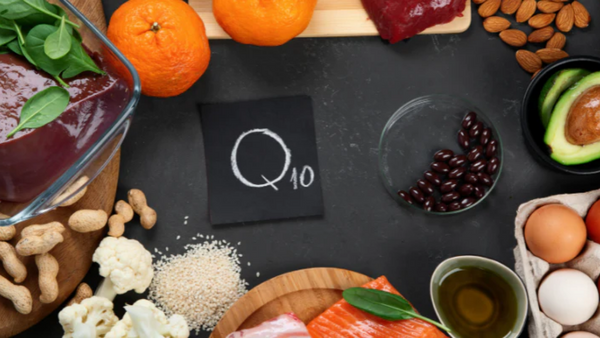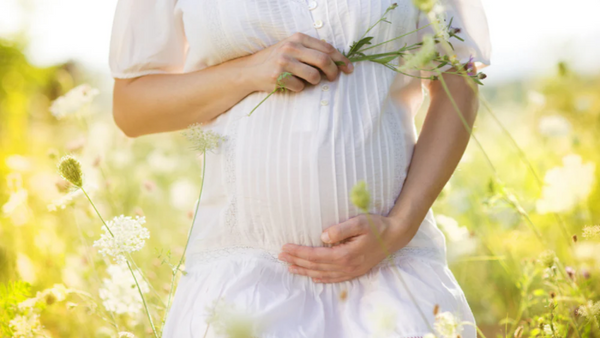Especially before and during pregnancy, your own lifestyle is crucial because it naturally also influences the growing baby. Some couples are often not aware of this. We present the nutrients that the expectant mother and the baby in her belly need and say whether and which nutritional supplements are really necessary.
General recommendations
A balanced diet, physical activity, good sleep and a generally healthy lifestyle are important for fertility in general and especially for pregnancy. The following tips - aimed at the expectant mother - can be a first guide when a couple is expecting a child:
- Eat fiber-rich foods
- Drink enough fluids (preferably water)
- Talk to your doctor about healthy weight gain during pregnancy
- Avoid raw or undercooked fish, soft cheese, undercooked meat and of course alcohol
- Make foods rich in protein, iron, calcium and folic acid a main part of your diet during pregnancy
- Supplement important nutrients - in consultation with your doctor
- Stay away from nicotine and cigarettes
- Exercise moderately during pregnancy
Vegetarian or vegan diet - a problem?
Opinions are divided on how healthy a vegetarian or even vegan diet is during pregnancy. Does the unborn child need substances from animal products?
The DGE considers a vegan diet to be completely unsuitable during pregnancy. In their view, a possible lack of iron, vitamins B12 and D3, as well as a lack of calcium pose health risks for the child.
On the other hand, the American Dietetic Association (ADA) and the Dietitians of Canada (DC) are of the opinion that a well-planned vegetarian or vegan diet is fine during pregnancy, provided that regular nutritional supplements are taken to compensate for any possible nutrient deficiencies.

In any case, you should avoid malnutrition during your pregnancy, no matter what your diet is. The risks for your baby are high. Talk to your gynecologist about what you eat. Together you can decide which path is best for you.
Should I supplement? And if so, with what?
A balanced diet is the basis for a good pregnancy and healthy development of the unborn child. However, it may be advisable to supplement certain nutrients, such as folic acid.
Here is an overview of vitamins and minerals that are particularly important for you during pregnancy.
Folic acid
Vitamin B9 plays an important role in cell division and is involved in many growth and development processes in the organism.
Folic acid is the industrially synthesized form of the vitamin, while folate is the umbrella term for all compounds of this water-soluble vitamin.
In fact, folic acid is one of the nutrients with which Germans are not adequately supplied, according to the Federal Institute for Risk Assessment (BfR). [1]
For women who want to have children, it is recommended that they take 400 micrograms (μg) of folic acid per day in addition to their diet through supplements, starting 4 weeks before the planned conception. If the time period is shorter, the dose should be increased to 800 μg. [2]
One effect of higher vitamin B9 levels in the body is, for example, the reduced risk of neural tube defects. [3]
iodine
During pregnancy, the need for iodine increases. This is due to the higher basal metabolic rate in the mother's body, the larger distribution area of the nutrient and the increased renal elimination, an increased excretion of predominantly water-soluble substances via the kidneys.
Since Germany is considered a country in which iodine deficiency is very common according to the Federal Ministry of Food and Agriculture (BMEL), supplementation is advisable for pregnant women. [4]
It is recommended to take 230 - 260 μg of iodine daily. [5]
If you supplement iodine, you must also ensure you have a good supply of selenium . Otherwise, iodine can cause oxidative stress.
iron
Iron is important for the growth and development of the child's brain. During pregnancy, the amount of blood in the woman's body increases, so she needs more iron for herself and her growing baby. About 27 mg of iron per day is recommended. [6]
Red meat is considered the most important source of iron.
But there are also some meatless sources of iron. These include, for example,
- Apricots
- millet
- Beetroot
- Whole grain products
- Legumes
Docosahexaenoic acid (DHA)
This polyunsaturated fatty acid, which belongs to the class of omega-3 fatty acids, is important for the development of the brain and vision of the unborn baby. As a semi-essential fatty acid, it must be ingested with food. [7]
If you don't often eat sea fish, you should take a supplement that contains long-chain omega-3 fatty acids.
Randomized controlled trials have shown that one of the health benefits of DHA is a significant reduction in the risk of preterm birth. [8]
calcium
Calcium during pregnancy may reduce the risk of preeclampsia, a serious condition that causes a sudden increase in blood pressure. [9]
If there is a deficiency, the calcium in the mother's bones can be used to build the baby's bones. In the worst case, this can lead to brittle bones (osteoporosis) in the expectant mother. [10]
Pregnant adults should consume 1000 mg of calcium per day. Pregnant teenagers (14-18 years) need about 1300 mg of calcium per day. [11]
Vitamin D
Vitamin D helps calcium build the baby's bones and teeth. Most experts agree that it is safe for pregnant women with vitamin D deficiency to take up to 2000 international units (IU) per day in the form of vitamin D supplements. [12]
However, only a small amount of vitamin D is absorbed through food. [13]
If you don't spend much time in the sun, for example because your skin type doesn't allow it, then your body can't produce enough of it in your skin.

These foods are spot on!
Whole grains
Whole grains are packed with fiber, vitamins and plant compounds, so try oats, quinoa , brown rice or barley instead of white bread, pasta and white rice.
Some whole grains, such as oats and quinoa, also contain a decent amount of protein, in addition to nutrients such as B vitamins, fiber, and magnesium . [14]
Lean meat and proteins
Lean beef, pork and chicken are excellent sources of high-quality protein. Beef and pork are also rich in iron, choline and B vitamins, which you need in larger quantities during pregnancy.
Low iron levels during early and mid-pregnancy can lead to iron deficiency anemia, which increases the risk of low birth weight and other complications. [15]
Eggs
Eggs are an incredible food because they contain almost all nutrients. One large egg contains about 80 Kcal, high-quality protein, fat and many vitamins and minerals.
They are also a great source of choline, an important nutrient during pregnancy. It supports the baby's brain development and helps prevent developmental disorders of the brain and spine.
A single whole egg contains about 147 mg of choline, bringing you closer to the recommended daily intake of 450 mg during pregnancy. [16]
Dairy products
During pregnancy, you need to consume extra protein and calcium to meet the needs of your growing baby. Dairy products contain two types of high-quality protein: casein and whey.
They are the best dietary source of calcium and provide large amounts of phosphorus, B vitamins, magnesium and zinc . Some varieties also contain probiotic bacteria that support gut health . [17]
Avocado
Avocados are high in monounsaturated fats, which gives them a buttery, rich taste - perfect for adding depth and creaminess to a dish.
They are also rich in fiber, B vitamins (especially folate), vitamin K , potassium, copper , vitamin E and vitamin C.
The healthy fats help build your little one's skin, brain and tissues, and folic acid can help prevent developmental disorders of the spine, such as spina bifida.
Potassium may also help relieve leg cramps, a side effect of pregnancy for some women. In fact, avocados contain more potassium than bananas. [18]
Legumes
This group of foods includes lentils, peas, beans, chickpeas, soybeans and peanuts.
Legumes are great plant-based sources of fiber, protein, iron, folate and calcium - all things the body needs more of during pregnancy.
Pulses are also generally very high in fiber, so if you haven't already done so, you should make pulses a regular part of your diet.
Fish
Fish is rich in essential omega-3 fatty acids , which have many important functions.
Additionally, fish is one of the few natural sources of vitamin D , which is important for bone health and immune function.
Berries
Berries contain significantly less sugar than other fruits.
Berries also contain many good things like vitamin C , fiber and antioxidants . They also have a relatively low glycemic index, so they shouldn't cause major spikes in blood sugar and are also recommended for type 2 diabetes. [19]
They're also a great snack that offers plenty of flavor and nutrients, but is relatively low in calories. Some of the best berries to eat during pregnancy include blueberries, raspberries, goji berries, strawberries, and acai berries.

Conclusion: During pregnancy there is an increased need for certain nutrients
Nothing beats a balanced, healthy diet combined with the right amount of exercise. This is especially true during pregnancy, when you have to think about your unborn child.
The right nutritional supplements will help you cover all the important nutrients for you and your baby.
However, you should always consult your doctor about dosage, safety, and possible risks and benefits.
In this article we will show you how you can positively influence your fertility.
There is also a small gift waiting for you there! To the article.
[1] https://www.bfr.bund.de/de/presseinformation/2005/30/folsaeurebedarf_in_deutschland_ist_unzureichend-6844.html
[2] https://pubmed.ncbi.nlm.nih.gov/28542653/
[3] https://pubmed.ncbi.nlm.nih.gov/22102928/
[4] https://www.bmel.de/DE/themen/ernaehrung/gesunde-ernaehrung/degs-jod-studie.html
[5] https://www.bfr.bund.de/cm/350/jod-folat-folsaeure-und-schwangerschaft.pdf
[6] https://ods.od.nih.gov/factsheets/Iron-HealthProfessional/
[7] https://pubmed.ncbi.nlm.nih.gov/32918470/
[8] https://pubmed.ncbi.nlm.nih.gov/27637340/
[9] https://www.cochrane.org/CD001059/PREG_calcium-supplementation-during-pregnancy-preventing-blood-pressure-disorders-and-related-problems
[10] https://pubmed.ncbi.nlm.nih.gov/22747842/
[11] https://www.ncbi.nlm.nih.gov/pmc/articles/PMC5561751/
[12] https://www.acog.org/clinical/clinical-guidance/committee-opinion/articles/2011/07/vitamin-d-screening-and-supplementation-during-pregnancy?utm_source=redirect&utm_medium=web&utm_campaign=int
[13] https://www.ncbi.nlm.nih.gov/pmc/articles/PMC1435950/
[14] https://pubmed.ncbi.nlm.nih.gov/12740067/
[15] https://www.ncbi.nlm.nih.gov/pmc/articles/PMC4375689/
[16] https://ods.od.nih.gov/factsheets/Choline-HealthProfessional/
[17] https://pubmed.ncbi.nlm.nih.gov/29425071/
[18] https://www.ncbi.nlm.nih.gov/pmc/articles/PMC3664913/
[19] https://pubmed.ncbi.nlm.nih.gov/20978741/

















